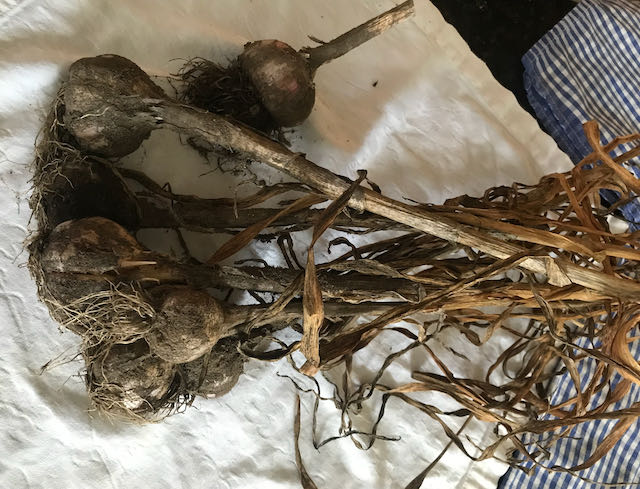The Season of Bulbs
I empty the brown paper bag on the kitchen counter, and watch 4 narcissi roll out in their dehydrated jackets and tangled roots. Slow stirring corms, packed labyrinths of tissue paper, they are like miniature libraries untouched for decades, hoarding their secrets.
I locate the blue and white Chinese pot on a shelf in the basement storage room next to cans of old paint and a child’s train set. Like the bulbs themselves, it has waited patiently for this in-between time of hidden metamorphosis.
It is the season of bulbs. Each year in them I am reminded of the nobility of the dormant times. Self-contained and proud, they make no excuses, nor beg for remission of their knobbiness. They carry within them the secret of the dark, the journey we shrink from, even though we know well enough what lies ahead: dry husks, dead boughs, disintegration. The season of diminution in the year is always, whether we are aware of it or not, a premonition of those times of invisibility and darkness in our own lives.
Out the window, the trees stand still for a brief time burnished and glorious – rose, salmon, deep pink, red and gold. But the fate of the bulbs is to be buried under – frozen and forgotten.
What gardener would choose to put us there — in a tepid limbo, isolated, curled in on ourselves, to all appearances resource-less? The dark and the deep, invisible times are states to avoid like a second plague — to fear, as a locale from which we may never emerge.
We dread losing our status, our stature, our tenures, our roles. Our youth, our middle age, our mental powers, our attractiveness.
Perhaps the dread is so keen because the seasons when we feel buried alive are real, bleak, and inevitable as age itself.
I have come to believe that this is why God gave us bulbs. Queens of the darkness, they enter into all we cannot fully know. They stir in the dark earthy sediment of fallen stars, chalk, rain, and bone. They are sacred guides to the dark seasons of our own lives, those times when we sink — whether through loss, change or age — into all that the years have accrued, our memories, longings and dreams.
For a long time in these dark times, nothing stirs. The darkness is so complete we might be living under a stone. Nothing visible pokes its head out from under the shroud of our withdrawal, or retreat, or hiddenness. Most often in such times, the best we can manage is simple routines.
But somewhere below the known habitations of the heart and the well-worn paths of my mind, beneath our knobby exteriors, after weeks or months or even years, we hear a small voice whispering, “This is not all.”
I have seen this happen countless times with those I sit with in spiritual direction. With long-time friends, and family. The labors of the darkness, struggling to bound an experience of trauma, or picking up the pieces after a shattering betrayal, or inching tiny step by step out of a professional failure towards a new future, eventually stir the atmosphere around us. Some enlivening of the elements — of the cosmos, it often feels — begin to align with our needs. We intuit that a new season is rising within, even if we have no idea what form it will take. All we are asked to do, within, is to trust the gathering warmth and increasing light. All we can do is begin to turn our faces towards the sun that we are newly aware still shines upon us.
Without quite knowing why we are doing so, we find ourselves engaged in old hobbies, or new practices. We begin to build little cairns on our walks. Or we pick up a camera and record the winter landscape. We dig out our drawing materials, or take up bird watching. As autumn’s dross burns off and the frigid earth turns towards spring, new life stirs in the ashes of our passing past. Some catalyst within the dark passage has engendered a “new thing” that it takes us time to recognize.
The lesson of the bulbs in our times is especially urgent.
Recently The New York Times ran a review of a new collection of poems by a prominent poet. With uncharacteristic frankness, the reviewer lamented the poet’s pace of production, and that of many poets writing today. Today’s poets are vastly outpacing the output of an earlier generation whose works have become classics: W.H. Auden, Yeats, Eliot.
Why? He asks. What’s the rush? To stay in the sunlight? To race against obscurity? To compete with the glut of news-feed with which we are assailed daily?
Forced production in poetry — as with flowers — begets anemic results, unworthy of the art. No high summer of praise and sunshine is infinite. Nothing can substitute for the alchemy that occurs in darkness, at the roots of the creative process. Without it, without the hiddenness of experience, observation, reflection, and reading, all artistic efforts fall flat and fade quickly.
Didn’t Robert Frost famously write to his beloved orchard in the late New Hampshire autumn:
“How often already you’ve had to be told,
Keep cold, young orchard. Good-by and keep cold.
Dread fifty above more than fifty below.”
Only with consistent cold and dark will the apple trees produce next summer’s fruit.
***********************
The night before the full November Beaver Moon, high and porcelain white in the clear night sky, Greg appeared at the door with a box of kindling, the last of his garden sage, a loaf of brown bread, two books of poetry — and, garlic.
Garlic — a vast sheath of them, tied in green raffia. His prize crop, Crenosh, he tells us. Still heavy with the soil from his plot, they are the last of this year’s harvest, pungent “fruits” that will carry us through much of the winter, adding their oils and savor and perfume to our soups and stews. Their wild flavor is intense, sharp, far more than its domesticated cousins.
“I husk them with a hard whack of my chef’s knife,” he tells me. A little dirt in the pot won’t hurt, too.
He had just come from his annual rite, a sacrament he performs entirely by hand on his knees in the earth, and alone, on his country acres. It is part of a well-choreographed project that he and his wife are laboring, to redeem with the grace of toil, amendments of soil, the goodness of gardens, a lapsed harmony of field and woods and hearth.
On a cool, sunny day, he gathers a large cluster of garlic from the harvest and separates out the largest cloves. Armed with lime and red worms, he heads to the plot he’s already cleaned, raked hoed. One by one he plants the bulbs, tips up, covers them gently with soil and straw, and stands to survey his work.
He thinks with anticipation of their bloom in April — the first burst of green and flower — and of how all living things in time become something else, become each other – worms, soil, garlic, human beings, birds, stars.
I know this, because in addition to his offerings of kindling and books, he has written a poem to celebrate this sacred passage in the dark.
Garlic and poems. Dust to dusk, ashes to ashes. In between these, we are tangy, sweet, ecstatic en-fleshed creatures who carry the nuclei of dreams and the tail of rainbows — fragile as tears, powerful as our angers and fears and hates. Our time here is so fleet, our fields, the seedbeds of wisdom: they can give meaning to our days, even our darkest passes, if we pause to gather not only the bounty but the lessons.
I bring the bulbs to my nose and smell both soil and stars. They are beautiful just as they are, dirt and awkward protuberances. And they will be beautiful come December or April or June, when all of us emerge from winter and feast on them with delight. Who are we, not to spend our days in praise of the likes of garlic?
At the sink, I fill the pot with a layer of stones. I will set it in a dark corner until the week before Christmas. I will listen and listen for the whispering rumors of the fertile dark.
Advent Blessings…





Jane Davidson
December 30, 2022at5:34 pmWith remembering to embrace the darkness of winter, we reset our internal clocks, and remember to slow down and enjoy the quiet of winter.
Kathleen Hirsch
January 1, 2022at10:15 pmthank you, Elizabeth!